South Africa
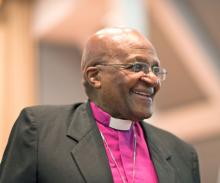
Engaging in international travel to participate in political justice — especially anti-apartheid issues in the Mid East and Africa — is a bit like playing big league baseball. The “player” must submit to an excellent coach, pick a good team, learn the essential rules about foreswearing violence, not getting caught stealing by the opposition, and arrive home safely with limited physical or psychic injury.
One of the “hall of fame” coaches still is Archbishop Emeritus Desmond Tutu who wisely said, “if we had taken up arms when things appeared hopeless in our struggle against apartheid in South Africa we would all be dead and apartheid would still exist.”
The Archbishop was in town last week for a CBS webcast interview along with American Episcopal Presiding Bishop Katherine Jefferts Schori on the “Mission of the Church.” He reinforced that “mission is about receiving the love of God in Jesus and then going to the world to make love incarnate” rather than trying to resolve the world’s terrible conflicts with military interventions.
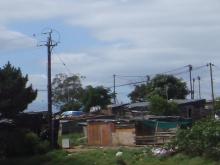
As an annual visitor to South Africa I am often asked, “will the budding democracy survive or will it go the way of other African dictatorship kleptocracies?”
For starters of course it can be said that all democracies, even America’s in an election year, are works in progress.
But beyond the obvious it is accurate to assert that the model post-apartheid constitution and bill of rights in the early 1990s established a sound foundation. The media and courts remain vibrant and even courageous, African National Congress party discipline is improving, the government is being held accountable for corruption and lack of basic service delivery, and a growing vocal parliamentary opposition is emerging. The grass roots civil society—planted and thriving from the liberation struggle—is active in movements such as Kairos Southern Africa.
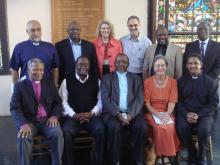
In 1985 the South African writers of the Kairos Document declared the Dutch Reformed Church’s “state church” theology to be heretical because of its justification of apartheid. In the months following, Desmond Tutu and many other anti-apartheid leaders risked their lives for change.
On the 2012 Centenary Celebrations of the African National Congress, 21 years after Nelson Mandela’s release from prison, the Kairos Southern Africa theologians have released, “A Word to the ANC in These Times.” The document boldly calls attention to the “certain contradictions [that] continue to militate against … fully achieving the dream that the injustice … meted out to black South Africans by the colonizers would come to an end.”
The document raised other critical issues, such as diminishing diversity, party factionalism and inappropriate security measures. The authors clearly declared, “A house divided against itself cannot stand.” (Matthew12:25)
The Kairos steering committee met with the ANC executive in a closed meeting February 8. The discussion focused on poor standards of education, unsustainability of an “opulent ‘American dream’ lifestyle, respecting the Constitution of the Republic, and closing the gap between the richest and poorest.

After two weeks of extensive talking, and running hours beyond schedule, a deal to cut global carbon emissions finally has been reached. As the climate conference in Durban, South Africa came to a close last weekend, a treaty known as the Durban Platform emerged, requiring all countries to begin curbing carbon emissions by 2020.
The deal binds all countries — rich and poor — to “hold the increase in global average temperature below 2C or 1.5C above pre-industrial levels,” according to the Framework Convention on Climate Change. Further, plans for enhanced action must be solidified by 2015, with the contracts bearing legal force.
Michael Jacobs, a member of the of the Grantham Research Institute on Climate Change and the Environment in London, told the BBC that " by forcing countries for the first time to admit that their current policies are inadequate and must be strengthened by 2015, it has snatched 2C from the jaws of impossibility. At the same time it has re-established the principle that climate change should be tackled through international law, not national, voluntarism.”
But the treaty has its drawbacks.
If justice is only an implication, it can easily become optional and, especially in privileged churches, non-existent. In the New Testament, conversion happens in two movements: Repentance and following. Belief and obedience. Salvation and justice. Faith and discipleship.
Atonement-only theology and its churches are in most serious jeopardy of missing the vision of justice at the heart of the kingdom of God. The atonement-only gospel is simply too small, too narrow, too bifurcated, and ultimately too private.
The rioting and rampages that spread across English cities last week have caused severe property destruction and raised public alarm. Writing in London's Guardian, community organizer Stafford Scott describes how he was among the group that on August 6 sought information from the police in Tottenham, a poorer section of London. They wanted an official statement on whether Mark Duggan had been killed by police bullets, as had been reported in the news.
All we really wanted was an explanation of what was going on. We needed to hear directly from the police. We waited for hours outside the station for a senior officer to speak with the family, in a demonstration led by young women. A woman-only delegation went into the station, as we wanted to ensure that this did not become confrontational. It was when the young women, many with children, decided to call it a day that the atmosphere changed, and guys in the crowd started to voice and then act out their frustrations.
This event is what most media accounts have identified as the spark that set England on fire, which has caught the world by surprise. Yet, says Scott, "If the rioting was a surprise, people weren't looking."
 An account in The New York Times by Ethan Bronner reports that Israeli women and West Bank Palestinian women and girls have once again broken Israeli laws. They have gone swimming in the Mediterranean Sea.
An account in The New York Times by Ethan Bronner reports that Israeli women and West Bank Palestinian women and girls have once again broken Israeli laws. They have gone swimming in the Mediterranean Sea.
More than two dozen Israeli women invited Palestinian women and girls from the southern part of the West Bank of the Jordan River -- who are not normally allowed into Israel and have no access to the sea -- to go swimming with them. Under Israeli military occupation since 1967, according to Bronner, "most had never seen the sea before."
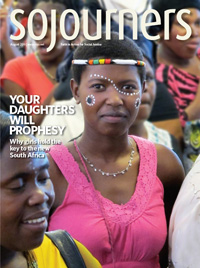 The lost art of reading might be in danger, but I'm happy to report that the desire to write remains strong, at least with Amazw'Entombi ("Voices of the Girls").
The lost art of reading might be in danger, but I'm happy to report that the desire to write remains strong, at least with Amazw'Entombi ("Voices of the Girls").
This creative writing club in Gugulethu, a township 10 miles outside Cape Town, South Africa, drew together nearly two dozen expressive girls, ages 13 through 20, each week for a year. With the help of a prompt -- a phrase or a short piece of writing to get started -- together the girls and I wrote. Like athletes in training, we built up from an initial three minutes of writing to, eventually, 20 minutes and sometimes longer when they asked for more time. Then we would go around the circle where we sat and read aloud what each of us wrote.
One week, the girls collectively wrote their manifesto (below), and staged a reading when the Flip camera came out. Then Sharon added her own contribution, "Proudly South African" (to hear her read, click here). She's now enrolled in her first year studying psychology at the University of Cape Town. I'm secretly hoping she switches to journalism.
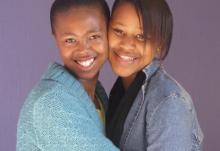
In the new South Africa, the future is speaking in the voices of the girls.
On March 7, 1965, 600 civil rights marchers attempted to walk from Selma to Montgomery, Alabama, in support of equal voting rights for blacks and whites.